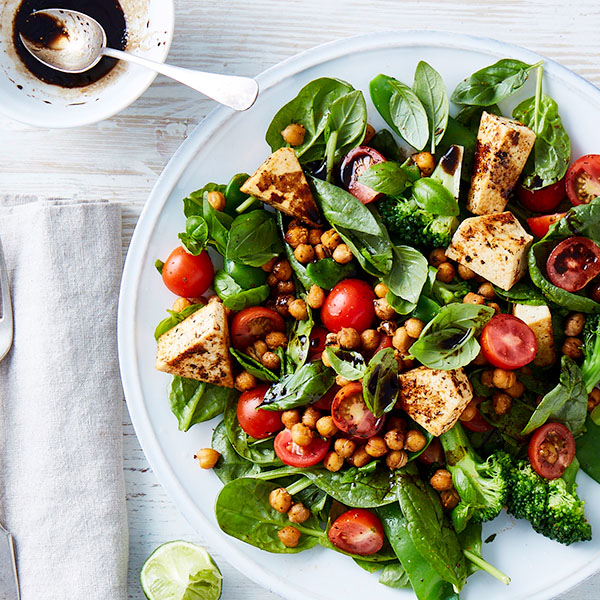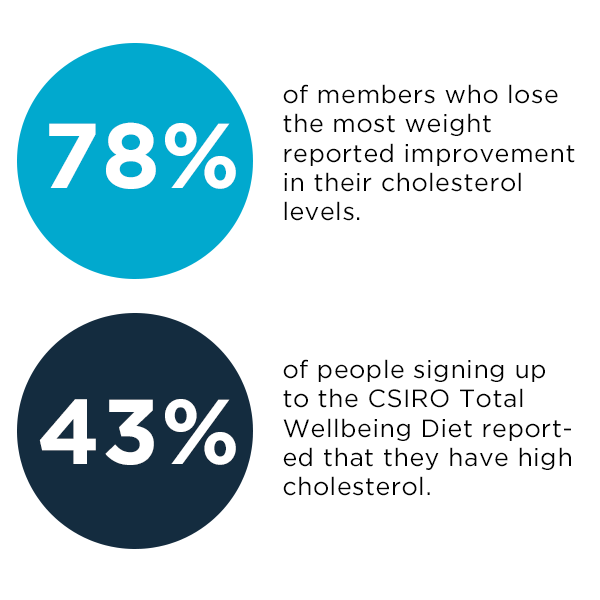How Diet Can Lower Cholesterol
The CSIRO Total Wellbeing Diet High Cholesterol Program is more than just a weight-loss strategy – it’s a protein packed, low saturated fat eating plan that helps lower your blood lipid levels (also known as your cholesterol).
The CSIRO conducted several trials to determine which dietary approaches give the best results for weight loss. The trials found the Total Wellbeing Diet resulted in significant reductions in total and LDL or ‘bad’ cholesterol, and increases in ‘good’ HDL cholesterol over 12 weeks.
How do I know if I have high cholesterol?
Detecting high cholesterol can be difficult because there are no visible symptoms and it must be diagnosed by a blood test from your doctor. High cholesterol is mostly caused by eating a lot of fatty food, not exercising, and excessive smoking or drinking but it is possible to be genetic. If left unchecked high cholesterol can lead to heart attack or stroke. A proper diet and exercise plan such as the scientifically formulated CSIRO Total Wellbeing Diet can help lower your cholesterol in just 12 weeks!
Total Wellbeing Diet for High Cholesterol
Studies have shown that eating a high protein, balanced meal plan is an effective approach to weight loss and improving your cholesterol levels.
When you join our the Total Wellbeing Diet, you will gain access to:
- A scientifically formulated weight loss plan from Australia's science agency CSIRO
- Easy and delicious high protein, low GI recipes to help lower cholesterol
- Educational content and special advice on how to lower your cholesterol
- Useful online tracking tools so you can watch your body change
- Access to our Android & iOS companion app
- Simple exercises you can do at home
- A supportive online community to keep you motivated
- A refund^ of $199 on selected plans
*Rated number one weight loss program on Trustpilot.
Get Started
What to expect when you join
The CSIRO Total Wellbeing Diet is a higher protein, low GI eating plan that has been created and tested by Australia’s national science agency, the CSIRO.
Our program is built around protein foods, but also includes plenty of grains, fruits and vegetables as well as ‘good’ fats that have been shown to reduce triglycerides and bad cholesterol in the blood.
By joining our online program you can improve your eating habits, lose weight, lower your cholesterol and improve your health.
Citation: Hendrie & Williams. CSIRO Total Wellbeing Diet Online: Member Survey. Understanding the health impacts of the program. CSIRO. 2019.
Get Started
Brenda avoided medication
Not only was Brenda able to lower her cholesterol levels without any medical intervention, she was able to avoid any nasty side effects that may have come with them. In addition, she dropped an impressive 17 kg*, which lead to a shopping spree and a whole new wardrobe.
*in 6 months. Individual results may vary.
Get StartedGlenda is now medication free
"I tried two different types of cholesterol tablets, but the side effects didn't seem worth it." With our program Glenda lost 23 kg*, and a blood test after the program revealed her blood sugar levels and blood pressure was normal and her cholesterol had dropped.
*in 6 months. Individual results may vary.
Get Started
Want to learn more about how our program can help high cholesterol?
Enter your name and email here and we'll send you everything you need to know about the CSIRO Total Wellbeing Diet.Frequently asked questions
How do I get the High Cholesterol Program?
Simply sign up to the CSIRO Total Wellbeing Diet by clicking here. When you login to your account for the first time, you'll guided through the initial setup and be prompted to choose a program preference. This is where you can indicate you would like to follow the program for high cholesterol.
Will my health fund help pay for the Total Wellbeing Diet?
Very possibly! We have partnerships with many of the top health funds in Australia, allowing members to claim back the cost of the membership under their Extras or Hospital Cover. Click through to find out if you're eligible to get our program rebated - or in some cases completely free of charge.
What is high cholesterol?
Cholesterol is a substance found in the fats in your blood. It’s produced by the liver and also made by most cells in the body, because cholesterol is essential for many of the body’s metabolic processes, including the production of vitamin D and hormones like oestrogen and testosterone.
When there’s too much LDL cholesterol, fatty deposits develop in the walls of the arteries - this is high cholesterol. It’s often referred to as ‘hardening of the arteries’ because it restricts blood flow to the heart, brain and rest of the body, increasing the risk of heart attack and stroke.
What is the best diet for someone with high cholesterol?
The best diet for someone with high cholesterol is one that is low in saturated and trans fats and high in fibre.
Lifestyle changes can make a big difference to your cholesterol levels, helping HDL levels to go up and LDL levels to come down.
As well as being an effective weight-loss strategy – which in itself helps improve cholesterol levels – research by the CSIRO found the Total Wellbeing Diet helps lower your LDL cholesterol levels by:
- Reducing your saturated fat intake and instead encouraging increased intake of unsaturated fats, which have been shown to increase levels of good HDL cholesterol. Oily fish like salmon and tuna, avocadoes, nuts and seeds, as well as olive oil are great choices.
- Avoiding trans fats – often lurking in biscuits, cakes and other processed foods – which increase LDL cholesterol and lower HDL cholesterol.
- Helping you eat more fruit and veg. They’re rich in fibre, including soluble, which can help lower LDL cholesterol.
- Including wholegrain carbohydrates which are a great source of both soluble and insoluble fibre.
- Encouraging consumption of low or reduced-fat milk, yoghurt and other dairy products.
- Reminding you not to worry about eggs. The cholesterol in eggs has almost no effect on your cholesterol levels. What matters is what you eat with eggs, so go easy on the bacon or skip it altogether.
How long before I see a reduction in my cholesterol levels?
Studies have shown that changing your diet can lower your cholesterol in as little as two weeks, but this can vary greatly depending on your weight, activity level and starting blood lipid levels.
What are the best foods to help lower cholesterol?
Eating a diet that is rich in fruits, vegetables, whole grains, and lean protein sources can help lower cholesterol levels.
This includes:
- Oily fish like salmon and tuna.
- Nuts and seeds, such as almonds, walnuts, and chia seeds, are high in unsaturated fats and fibre.
- Whole grains, such as oatmeal, barley, and brown rice. Oats contain beta-glucan, a type of soluble fibre which binds with cholesterol, encouraging it out of the digestive system rather than into the bloodstream.
- Nuts and seeds, such as almonds, walnuts, and chia seeds, are high in unsaturated fats and fibre, which can help lower cholesterol levels.
- Plant-based proteins, such as beans, lentils, and tofu, are low in saturated fat and high in fibre, which can help lower cholesterol levels.
- Fresh fruit and vegetables. Apples, grapes, strawberries and citrus fruits are particularly rich in pectin, a type of soluble fibre that can help lower levels of harmful cholesterol.
- Low or reduced-fat milk, yoghurt and other dairy products.
What foods should I avoid if I have high cholesterol?
If you have high cholesterol, it's important to avoid foods that are high in saturated and trans fats, as these types of fats can raise your total cholesterol levels and increase your risk of heart disease.
The main sources of saturated fat in Australians’ diet include treats like cakes, muffins and biscuits, full fat dairy foods in particular cheese and full cream milk, fatty cuts of meat and processed meat products, deep fried foods, pastries and pies. Consuming too much of any of these foods can increase levels of LDL cholesterol in the blood, and so their consumption should be limited as much as possible.
Where you can, try to avoid the following:
- Processed foods. Usually high in salt, saturated fats and sugars too. Bacon, ham, takeaway foods, chips, cakes and biscuits are best kept to a minimum.
- Saturated fats. Steering clear of too much red meat (and cutting visible fat off all meat) as well as avoiding full-fat dairy products can considerably reduce bad cholesterol levels. Also try to avoid trans fats hidden in processed foods like pastries and cakes.
- Salt. To significantly lower blood pressure and the risk of heart disease, the Heart Foundation recommends eating less that 5g of salt – that’s less than a teaspoon – a day. Check the sodium content of all foods via their Nutrition Information Panel – ideally they should contain less than 120mg of sodium per 100g. Always look out for ‘no added salt’ varieties in packaged and canned foods.
I have multiple health issues, which program is best for me?
Many of our members have multiple health issues when joining our program. If this is you, choose the issue that you would most like to improve.
Do I need a doctor’s referral?
No, you do not need a referral from your doctor to join the CSIRO Total Wellbeing Diet.
Do I still need to see my doctor?
Weight loss can impact the amount of medication you need. We recommend keeping in contact with your doctor and scheduling an appointment and getting your cholesterol tested after 12 weeks.